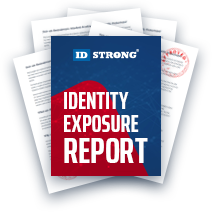Pipl Opt-Out
Table of Contents
What Does Pipl Do?
Pipl is a "provider of identity solutions"; they create brief aggregate reports summarizing known online information about a target person. Otherwise known as a people search website, any individual can use it to gain access to already public knowledge. In some cases, the data may be limited to names and cities, in others, it may include personally identifiable information. Data like birthdays, maiden names, and criminal records may be discovered.
Some information is provided via government databases and private corporation servers. Pipl legally collects data about their members and users who pass through their web beacons, advertisements, and marketing. They also receive information from affiliates and their investor patron, Israel Growth Partners; a tech company based out of Israel with a business model focused on identity monitoring and protection.
How Do I Remove Information From Pipl?
Typically, the reports provided by a people search website have errors; consumers can choose to correct this data. However, most want to opt out. Opting out does not mean limiting the use or deleting the information. Instead, it places the equivalent of a "suppression flag" on the data; the information doesn't appear in the results when searched. Limiting and deleting consumer data removes this flag, restarting the last 12 months of recorded history. In Pipl's case, this includes some automated website verification processes ("removing…online" below).
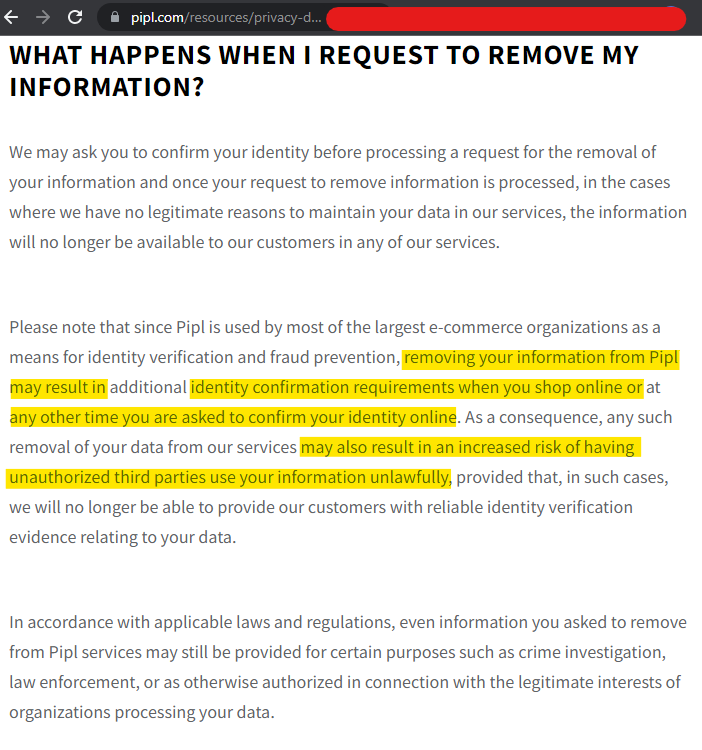
The average consumer may hesitate after considering the verifications they would have to complete; would the additional hassle make it worth it to remove my name from Pipl? The second part of the highlighted passage above increases one's worries ("may…unlawfully"), implying possible consequences for opting out. Both sentences are retention tactics meant to deter the consumer in unfamiliar territory.
Knowing the information in the screenshot above helps to position the consumer better if their requests are rejected or ignored. Pipl can decline opt out requests (barring California inhabitants), and residents outside California may have more verification steps. Much of the Pipl process includes interaction with live representatives or humans at some point (emails, forms); they may argue the subjects as a reason not to opt out, however, neither argument usurps the necessity of personalized cybersecurity.
Where to Start Your Pipl Opt-Out?
Consumers can request an opt out from Pipl, but methods are limited. Although Pipl offers a Contact Us form, they may reject opt out requests made through it. Additionally, it is unlikely to receive an opt out confirmation over email. Consumers who want to email Pipl may send their messages to privacy@pipl.com; or call their customer service department at 1-(415)-373-0180 to speak with a live representative. Pipl has two phone numbers; the other (below) is to request an opt out, while the number above cannot.
Pipl offers two main solutions for those consumers wanting to opt out. California residents have a specialized in-browser form, while everyone else has their version. The following section gives tutorials on who to call and what to say, the California and national forms. An accessible email is necessary to complete the forms, preferably a newly created side or throw-away account. Create a free, safe option using a third-party provider like Google in two minutes.
How to Opt-Out of Pipl Data Sharing and Selling
Call Pipl's Live Representatives for Opt-Out Assistance
Consumers wanting to speak with a live representative about their opt out options can call 1-(877)-616-1115; this number is a specific department of Pipl's service team, which assumes the consumer's desire to opt out. When called, the live representative asks how they can help, the caller must verbally express the desire to opt out. Consumers are strongly encouraged to note the differences in terms used in this conversation.
As mentioned in the first section of this article, there are nuanced aspects to opting out, limiting, and deleting data. The terminology is vital because conflation can occur seamlessly, changing the desired outcome. If a Pipl member calls and says, "I want Pipl to stop sharing my data", an agent might cancel their account; that leaves the public opt out process still to be done. On the other hand, if a non-member calls and requests, "Pipl stop selling and sharing my information in public searches", the agent gains more insight into the specific request and desired outcome.
Some consumers may necessarily need to speak with a customer rep. Necessary support calls can occur any time Pipl denies a privacy data alteration request; if the consumer is suppressing multiple records; and when the record to be suppressed is associated with a minor. Those looking to suppress multiple or minor records should call, rather than fill out the forms below.
Opt-Out Using Pipl's Quick Forms Based on Residency
Pipl offers two form options for an opt out, one specifically for residents of California. Inhabitants of California are granted special data privacy protections by state law; Californians are guaranteed an opt out confirmation, barring information confiscated by the government or authorities. Conversely, those outside California aren't guaranteed acceptance of the request.
Pipl retains its ability to reject any request for suppression. More specifically, their privacy documents indicate they can keep information public if deemed for their best "interest". It also says they'll contact the interested party if the Pipl customer support team cannot follow through with a request.
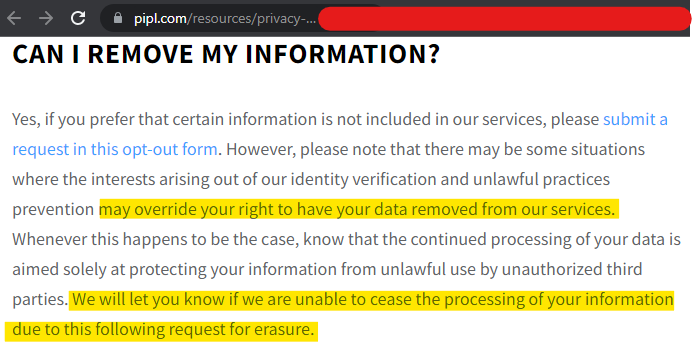
The interesting aspect of the screenshot above is that it clashes with the process of the forms. The shot above indicates the customer service team will only reach out in case of a request rejection; however, the emails immediately sent after the request forms necessarily indicate a representative conversation. Whether this conversation occurs over the phone or by email may depend on the representative.
- California residents will find their opt out form here.
- People outside California will find their opt out form here.
Step One
After opening whichever form best describes your residency location, you must enter basic contact requests. Both forms request the same information, but one requires a message while the other doesn't. The California form is used in the shot below, and a message to the customer support team is submitted.
Enter at least your name and email address; entering a phone number and address will help verify who is making the request. Enter the following message into the space provided: "I want to opt out of selling and sharing my personal information and public search results". Check the CAPTCHA box, then click the "Submit" button.
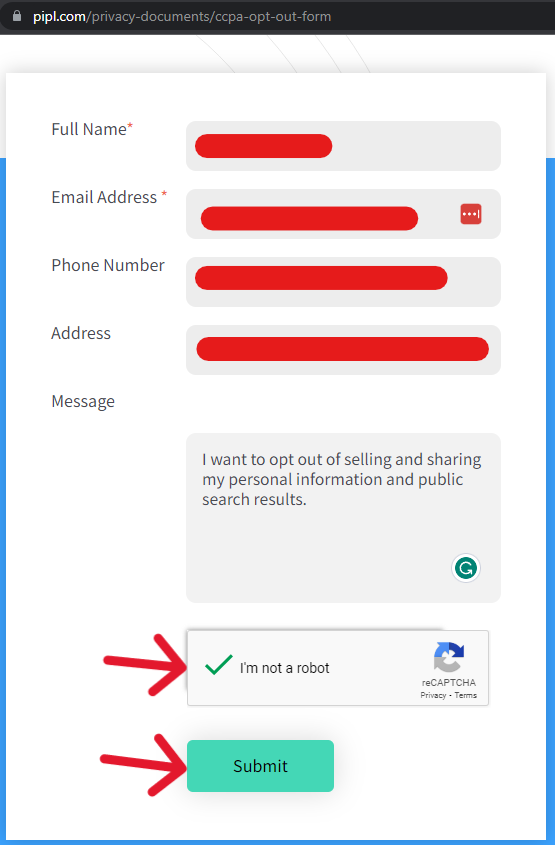
Immediately the page should fulfill the request and refresh. The new page will display a "thank you" for the request and a redirection to the email provided. Completion of either form will result in seeing this page.
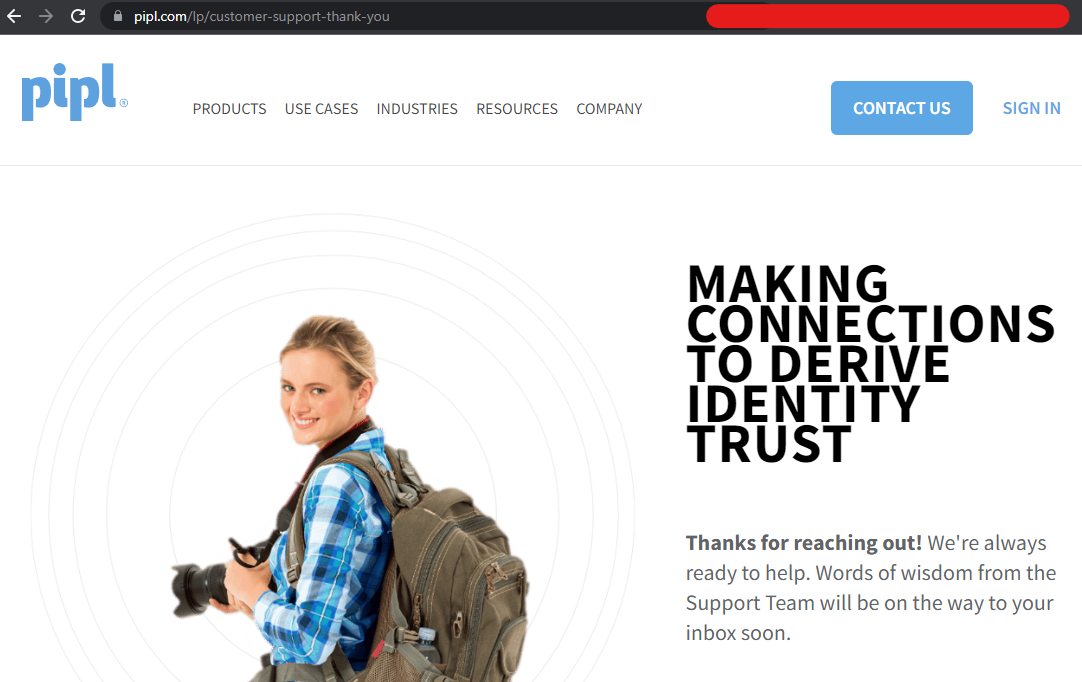
Step Two
Head to the provided email, and there should be an automated email from Pipl Salesforce. This email will contain the hours they will likely attempt to contact the consumer; hours of operation are Monday - Friday, 7:00 am - 3:00 pm PST. The email also contains a referenceable request ID or case number.
There are two response emails in the screenshot below. The one on top, outlined in red, results from a non-California resident making an opt out request. The bottom, outlined in blue, is the response given to a California resident. In both cases, the consumer is required to wait for further instruction.
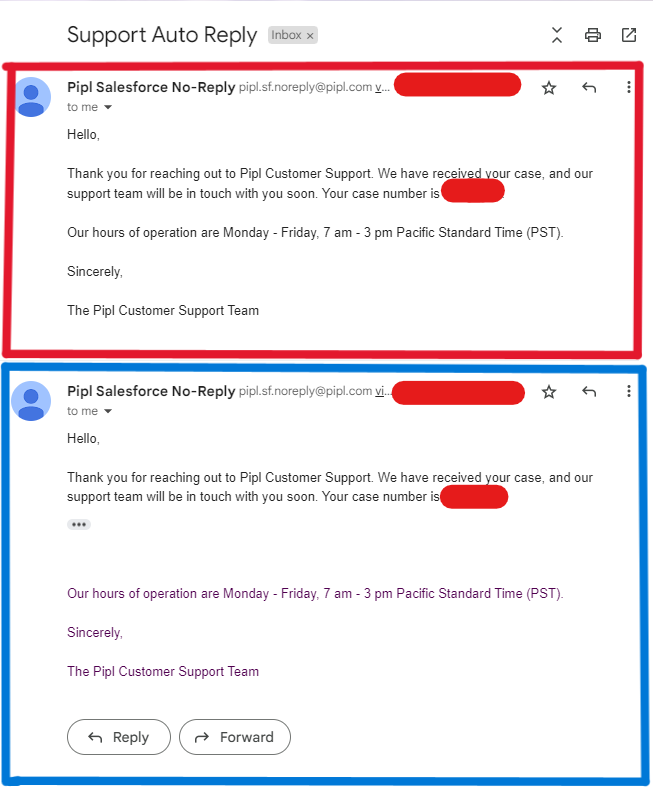
Consumers who share only their email are likely to receive a verification request within the following ten business days. Generally, this verification process is quick. It may include an in-email button with assisted directions or a one-time passcode to a communication account.
Regardless of the communication avenue chosen by the customer service representative, completing this verification process is necessary. It is the only way for the company to verify who makes the request; not completing the process means the request cannot be submitted or enacted.
Return Annually to Remove Current Information
Pipl gains public information by acting as a data processor or service provider. Subsequently, they provide reports that are current and as accurate as possible. To achieve this, people search sites collect massive amounts of information, whether accurate or not. They also record information regardless of its existence already in the database. Part of the growing problem with aggregate record providers is their inability to identify already suppressed data. Pipl speaks about this specifically in the shot below:
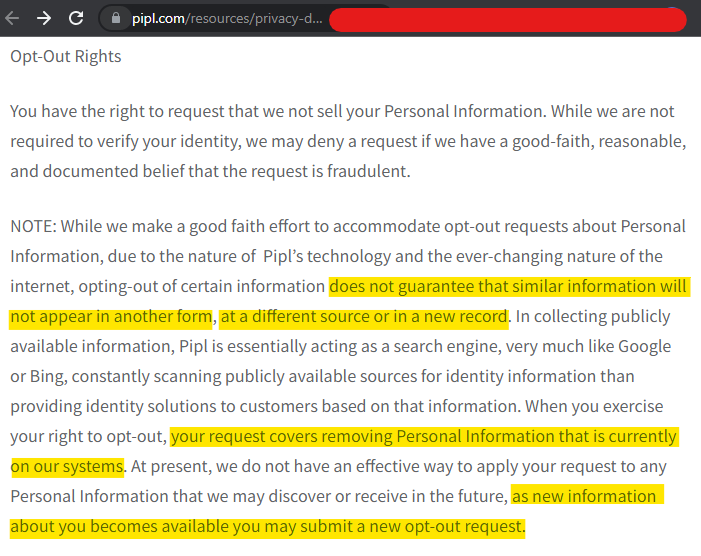
The consumer must monitor their status because Pipl cannot predict and thus suppress possible records retroactively. Pipl says their search results are active for 12 months, meaning the consumer should check back annually. Searching on the main page is easy enough to see if the information is still available.
If a consumer receives confirmation of suppression, they should search for the record. Verifying that the record is completely hidden from the public is necessary to request an opt out. Consider setting an alarm or calendar reminder; Pipl claims a ten-day response window; however, their privacy policy implies a process as long as 30 days. This guide is up to date with the current processes of opt out solutions provided by Pipl's privacy policy (2023).
